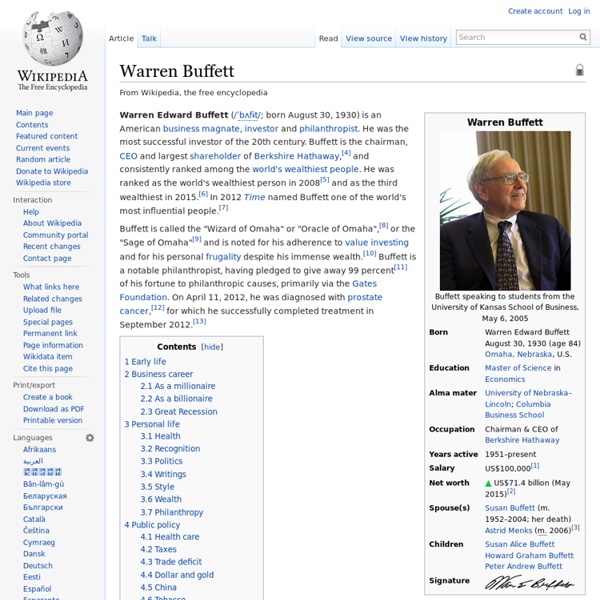Boursorama : numéro 1 de la banque en ligne et portail leader de l'information financière
Economics and Politics by Paul Krugman - The Conscience of a Liberal
Forex Trading Online | Trade FX, CFDs, FX Options at Saxo Bank
Paul Volcker
Paul Adolph Volcker, Jr.[1] (born September 5, 1927) is an American economist. He was Chairman of the Federal Reserve under Presidents Jimmy Carter and Ronald Reagan from August 1979 to August 1987. He is widely credited with ending the high levels of inflation seen in the United States during the 1970s and early 1980s. He was the chairman of the Economic Recovery Advisory Board under President Barack Obama from February 2009[2] until January 2011.[3] Early life[edit] Volcker's undergraduate education was at Princeton University; he graduated in 1949. Career[edit] In 1952 he joined the staff of the Federal Reserve Bank of New York as a full-time economist. From 1969 to 1974, Volcker served as under-secretary of the Treasury for international monetary affairs. In 1975, Volcker also became a senior fellow in the Woodrow Wilson School of Public and International Affairs at Princeton University. Chairman of the Federal Reserve[edit] Debt to GDP ratio, 1981-1993 Debt to GDP ratio, 1993-2001
301 Moved Permanently
Joseph Stiglitz
Joseph Eugene Stiglitz, ForMemRS, FBA (born February 9, 1943) is an American economist and a professor at Columbia University. He is a recipient of the Nobel Memorial Prize in Economic Sciences (2001) and the John Bates Clark Medal (1979). He is a former senior vice president and chief economist of the World Bank, and is a former member, and Chairman of the Council of Economic Advisers.[2][3] He is known for his critical view of the management of globalization, free-market economists (whom he calls "free market fundamentalists"), and some international institutions like the International Monetary Fund and the World Bank. Life and career[edit] Stiglitz was born in Gary, Indiana, to Jewish parents, Charlotte (née Fishman) and Nathaniel D. In addition to making numerous influential contributions to microeconomics, Stiglitz has played a number of policy roles. In 2011, he was named by Foreign Policy magazine on its list of top global thinkers.[27] Contributions to economics[edit]
Online Trading & Investing | Investment Services | Charles Schwab
Investors should consider carefully information contained in the prospectus, including investment objectives, risks, charges, and expenses. You can request a prospectus by calling Schwab at 800-435-4000. Please read the prospectus carefully before investing. Investment returns will fluctuate and are subject to market volatility, so that an investor’s shares, when redeemed or sold, may be worth more or less than their original cost. Schwab’s short-term redemption fee of $49.95 will be charged on redemption of funds purchased through Schwab’s Mutual Fund OneSource® service (and certain other funds with no transaction fees) and held for 90 days or less. Trades in no-load mutual funds available through Schwab’s Mutual Fund OneSource service (including Schwab Funds), as well as trades in certain other funds, are available without transaction fees when placed through Schwab.com or our automated phone channels. 1.
Collateralized debt obligation
A collateralized debt obligation (CDO) is a type of structured asset-backed security (ABS).[1] Originally developed for the corporate debt markets, over time CDOs evolved to encompass the mortgage and mortgage-backed security ("MBS") markets.[2] Separate special purpose entities—rather than the parent investment bank—issue the CDOs and pay interest to investors. As CDOs developed, some sponsors repackaged tranches into yet another iteration, knows as "CDO-squared" or "CDOs of CDOs."[2] In the early 2000s, CDOs were generally diversified,[3] but by 2006–2007—when the CDO market grew to $100s of billions—this changed. Market history[edit] Beginnings[edit] Until about 2005, CDOs were diversified, and might consist of everything from aircraft lease-equipment debt, manufactured housing loans, to student loans and credit card debt. Explanations for growth[edit] Subprime mortgage boom[edit] IMF Diagram of CDO and RMBS Securitization markets were impaired during the crisis. Crash[edit] Criticism[edit]
10 Lesser Known Economic Issues
Politics While not an economist in the traditional sense, I am very interested in the study of economics. While not everyone shares this level of interest, I believe people should have an understanding of economics as the field is so important to understanding the world that we live in. Also known as the Diamond-Water Paradox, the paradox of value is the contradiction that while water is more useful, in terms of survival, than diamonds, diamonds get a higher market price. This paradox can possibly be explained by the Subjective Theory of Value, which says that worth is based on the wants and needs of a society, as opposed to value being inherent to an object. Khazzoom–Brookes Postulate This proposal was named after economists Daniel Khazzoom and Leonard Brookes, who argued that increased energy efficiency, paradoxically, tends to lead to increased energy consumption. “Increased energy efficiency can increase energy consumption by three means. Economics has many categories for “goods”.



